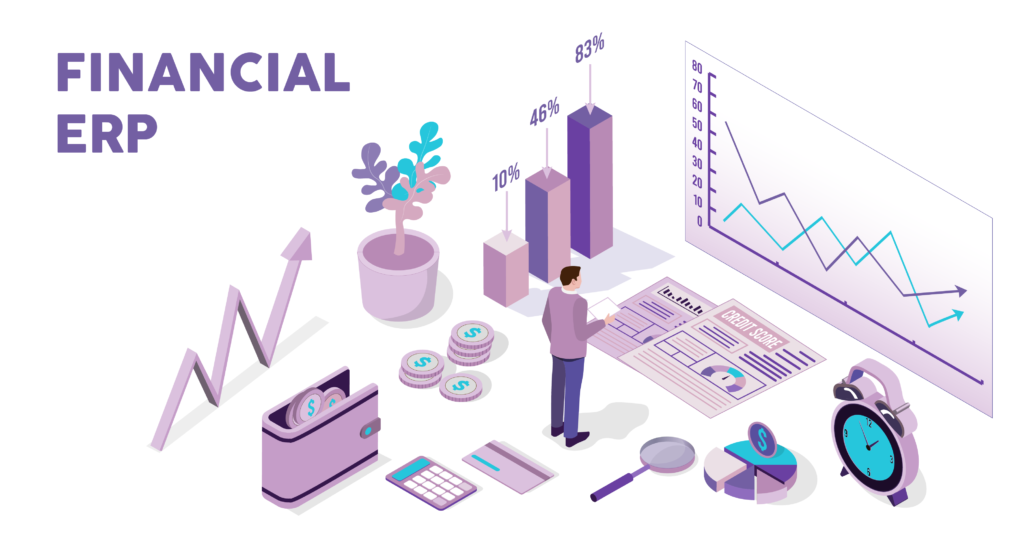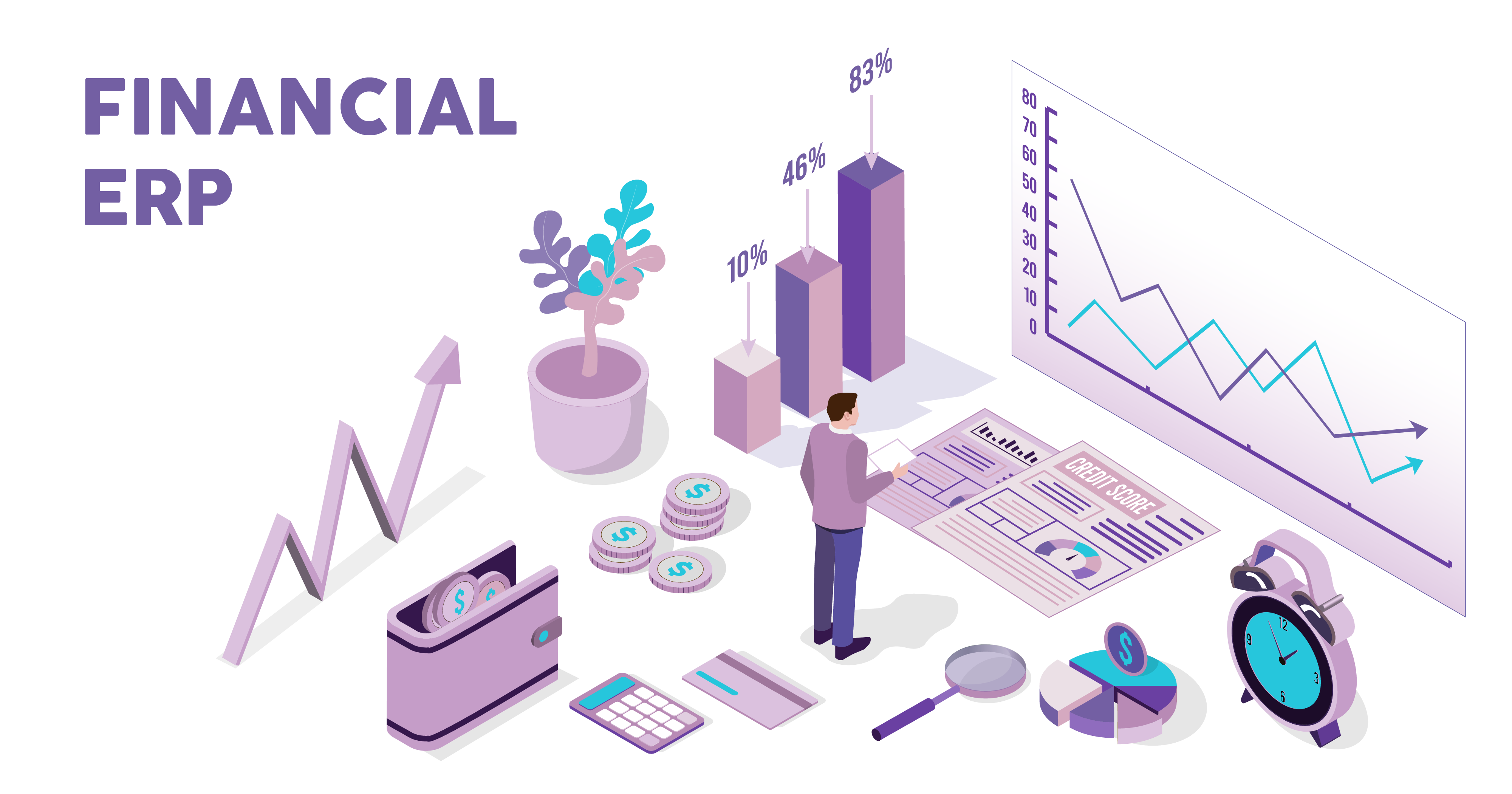Managing a business’s financial operations and customer relationships are two of the most critical aspects of any organization. Financial ERP and CRM Integration are two powerful tools used by companies to streamline these processes. Integrating these systems can provide significant benefits to businesses, from enhanced visibility to better decision-making.
In this article, we’ll discuss the benefits of integrating Financial ERP and CRM systems, as well as provide an overview of a leading ERP system in the industry.
Benefits of Financial ERP and CRM Integration

Improved Data Management: By integrating Financial ERP and CRM systems, businesses can create a single source of truth for all their financial and customer data. This enables better decision-making by providing real-time, accurate information to decision-makers. Integrating Financial ERP and CRM systems can improve data management by creating a single source of truth for all financial and customer data. This can reduce the amount of time spent on manual data entry and increase data accuracy. With a single source of truth, businesses can ensure that all teams are working with the same information and avoid discrepancies between systems. This can help businesses make more informed decisions based on reliable data.
Enhanced Visibility: Integrating financial and customer data allows businesses to gain a holistic view of their operations. This visibility can help identify trends, patterns, and opportunities that may otherwise be missed. Integrating Financial ERP and CRM systems can provide businesses with a more comprehensive view of their operations, including financial and customer data. This visibility can help identify trends, patterns, and opportunities that may otherwise be missed. For example, by analyzing customer data alongside financial data, businesses can identify which customers are the most profitable and focus their resources on retaining those customers.
Increased Efficiency: Integrating Financial ERP and CRM systems can also help streamline processes, reducing the amount of manual data entry required. This can free up time for staff to focus on more strategic tasks. Integrating Financial ERP and CRM systems can help streamline processes, reducing the amount of time and effort required for tasks such as invoicing and payment processing. For example, by automating the process of generating invoices and syncing them with financial records, businesses can reduce the risk of errors and save time on manual data entry. This can free up resources to focus on other important tasks, such as customer service and business development.
Better Customer Experience: A Financial ERP and CRM integration can provide businesses with a more comprehensive understanding of their customers’ needs and behaviors. This can help improve the customer experience by enabling personalized interactions and targeted marketing campaigns. Integrating Financial ERP and CRM systems can provide businesses with a more comprehensive understanding of their customers’ needs and behaviors. This can help improve the customer experience by enabling personalized interactions and targeted marketing campaigns. For example, by analyzing customer data alongside financial data, businesses can identify which customers are most likely to purchase additional products or services and tailor marketing campaigns to those customers. This can help increase customer satisfaction and loyalty, leading to improved business performance over time.
Overall, integrating Financial ERP and CRM systems can provide businesses with a more complete view of their operations, enabling more informed decision-making and improved customer experiences. By streamlining processes and improving data management, businesses can save time and resources while focusing on growth and profitability.
Overview of a Leading ERP System: SAP S/4HANA
SAP S/4HANA is one of the most popular Financial ERP systems in the industry. It is designed to help businesses streamline their financial operations, providing real-time data and analytics to support decision-making. Here are some of the key features of SAP S/4HANA:
Financial Management: SAP S/4HANA provides a comprehensive financial management system, including accounts payable and receivable, cash management, and general ledger. It also includes advanced analytics and reporting capabilities to help businesses make informed decisions.
Supply Chain Management: SAP S/4HANA offers supply chain management capabilities, including inventory management, order processing, and production planning. This can help businesses optimize their supply chain operations and improve efficiency.
Human Resources: SAP S/4HANA includes HR capabilities, including personnel management, payroll, and benefits administration. This can help businesses manage their workforce more effectively and improve employee satisfaction.
Customer Experience: SAP S/4HANA provides customer experience management capabilities, including CRM integration and marketing automation. This can help businesses provide personalized customer interactions and targeted marketing campaigns.
Integrating SAP S/4HANA with a CRM System:
SAP S/4HANA can be integrated with a CRM system, such as Salesforce, to provide a complete view of customer interactions and financial data. Here are some of the benefits of integrating SAP S/4HANA with a CRM system:
Improved Sales and Marketing: By integrating financial and customer data, businesses can gain a better understanding of customer needs and behaviors. This can help improve sales and marketing efforts by enabling personalized interactions and targeted campaigns.
Streamlined Processes: Integrating SAP S/4HANA with a CRM system can help streamline processes, reducing the amount of manual data entry required. This can free up time for staff to focus on more strategic tasks.
Enhanced Reporting: Integrating financial and customer data can provide businesses with enhanced reporting capabilities, enabling better decision-making. This can help identify trends, patterns, and opportunities that may otherwise be missed.
Improved Customer Experience: Integrating SAP S/4HANA with a CRM system can help businesses provide a better customer experience by enabling personalized interactions and targeted marketing campaigns.
Integrating Financial ERP and CRM systems can provide significant benefits to businesses, including improved data management, enhanced visibility, increased




